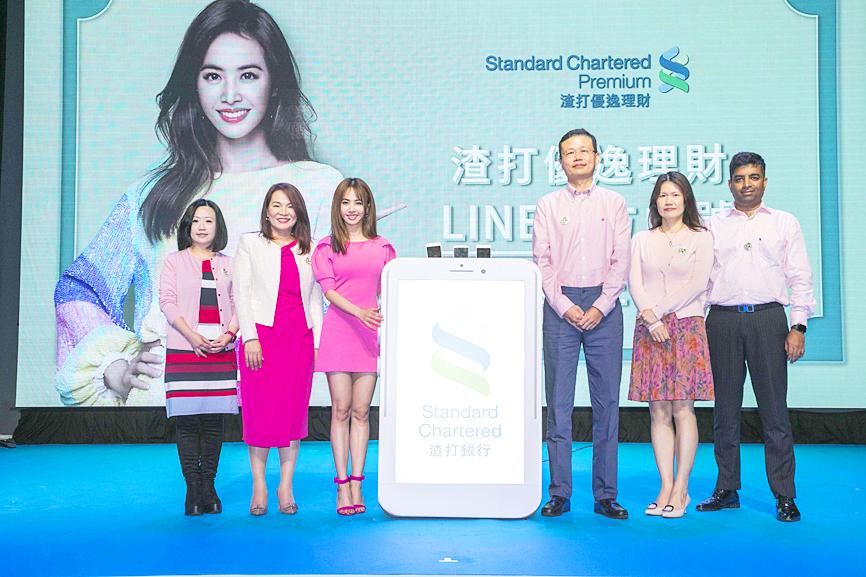Standard Chartered Bank Taiwan Ltd (渣打台灣銀行) yesterday said it took home the International Retail Bank of the Year — Taiwan and the Digital Banking Initiative of the Year — Taiwan from this year’s Retail Banking Awards presented by Asian Banking and Finance magazine.
The event honors the most outstanding banks and financial institutions that have introduced groundbreaking products and services to empower them to adapt to a rapidly evolving tech landscape.
Standard Chartered Taiwan’s retail banking shows that it deserves its spot as one of the top retail businesses among the international banks in Taiwan. With its attractive returns, it continues to grow its franchise in a profitable and cost-effective way, while successfully navigating headwinds due to the COVID-19 pandemic and volatile global market conditions.

Photo courtesy of Standard Chartered Bank Taiwan Ltd
“We are delighted to receive this commendation from Asian Banking and Finance,” Standard Chartered Taiwan retail banking head Kate Lin (林素真) said. “This is the testimony to the efforts to reinvent and digitize the business model with a human touch. It also demonstrated the right strategy of focusing on clients, which inspired the team to continue to provide the best services to our clients and to further discover their unmet needs.”
Last year, Standard Chartered Taiwan delivered significant growth in income and operating profit. With the bank’s strategic focus on high-net-wealth and affluent segments, top-line growth was mainly driven by underlying wealth management growth, coupled with double-digit growth in core lending products.
Moreover, to capture the swift changes in client behavior and the evolution of financial services, Standard Chartered Taiwan has reinvented its business model along with innovative digital initiatives with its launch of SC Taiwan Line official accounts and SC Keyboard Banking last year.
The Line accounts aim to extend banking services from clients’ fingertips to their social activities.
Embedded in SC Line official accounts, an artificial intelligence-powered chatbot named Stacy provides instant, round-the-clock interactive support with the know-how to fulfill requests and solve problems, ranging from the latest product offerings to credit card payments and reward point inquiries.
SC Keyboard Banking is the first-ever keyboard-based social media payment capability in Taiwan, which allows people to send money and view account balances without interrupting their social moments on messaging apps. The application boasts three key features of this cutting-edge service: seamless client journey, gamification and community, as well as single tap to banking services.
SC Keyboard Banking empowers clients’ digital capability in an easy and seamless way, and has received broad and positive feedback.
This year, Standard Chartered Taiwan said it aims to continue to expand partnerships with fintech, tech and e-commerce companies to build an ecosystem and originate the younger digital adopter segment.
The bank also aims to leverage COVID-19 prevention experiences, continue to build a future-proof organization by cultivating agile ways of working and building an active-learning culture to equip its entire workforce with future skills, it said.

Taiwan’s technology protection rules prohibits Taiwan Semiconductor Manufacturing Co (TSMC, 台積電) from producing 2-nanometer chips abroad, so the company must keep its most cutting-edge technology at home, Minister of Economic Affairs J.W. Kuo (郭智輝) said yesterday. Kuo made the remarks in response to concerns that TSMC might be forced to produce advanced 2-nanometer chips at its fabs in Arizona ahead of schedule after former US president Donald Trump was re-elected as the next US president on Tuesday. “Since Taiwan has related regulations to protect its own technologies, TSMC cannot produce 2-nanometer chips overseas currently,” Kuo said at a meeting of the legislature’s

TECH WAR CONTINUES: The suspension of TSMC AI chips and GPUs would be a heavy blow to China’s chip designers and would affect its competitive edge Taiwan Semiconductor Manufacturing Co (TSMC, 台積電), the world’s biggest contract chipmaker, is reportedly to halt supply of artificial intelligence (AI) chips and graphics processing units (GPUs) made on 7-nanometer or more advanced process technologies from next week in order to comply with US Department of Commerce rules. TSMC has sent e-mails to its Chinese AI customers, informing them about the suspension starting on Monday, Chinese online news outlet Ijiwei.com (愛集微) reported yesterday. The US Department of Commerce has not formally unveiled further semiconductor measures against China yet. “TSMC does not comment on market rumors. TSMC is a law-abiding company and we are

FLEXIBLE: Taiwan can develop its own ground station equipment, and has highly competitive manufacturers and suppliers with diversified production, the MOEA said The Ministry of Economic Affairs (MOEA) yesterday disputed reports that suppliers to US-based Space Exploration Technologies Corp (SpaceX) had been asked to move production out of Taiwan. Reuters had reported on Tuesday last week that Elon Musk-owned SpaceX had asked their manufacturers to produce outside of Taiwan given geopolitical risks and that at least one Taiwanese supplier had been pushed to relocate production to Vietnam. SpaceX’s requests place a renewed focus on the contentious relationship Musk has had with Taiwan, especially after he said last year that Taiwan is an “integral part” of China, sparking sharp criticism from Taiwanese authorities. The ministry said

US President Joe Biden’s administration is racing to complete CHIPS and Science Act agreements with companies such as Intel Corp and Samsung Electronics Co, aiming to shore up one of its signature initiatives before US president-elect Donald Trump enters the White House. The US Department of Commerce has allocated more than 90 percent of the US$39 billion in grants under the act, a landmark law enacted in 2022 designed to rebuild the domestic chip industry. However, the agency has only announced one binding agreement so far. The next two months would prove critical for more than 20 companies still in the process